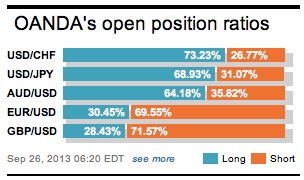Capital Markets are talking more about month and Q3-end demand. The supposed request for the “mighty” dollar could very much end up distorting all that other noise that investors sometimes find deafening. Fiscal cliffs, budget deficits, government shutdowns and the Middle East to name but a few, could end up not being that magnetic directional pull for G10 currencies in the most immediate of times.

Supply and month end requirements will probably end up having most of the control over a currency’s direction during the next couple of trading sessions. Both logic and reasoning could be about to take a back seat. In truth, that after several days of inactivity since the FOMC, trade intentions have plummeted. Do not be surprised that many individuals will want an excuse to sit on their hands until next weeks NFP data release – event risk and month end flows are most likely to curtail risk-taking.
It’s impossible for most organizations not to have one or two disgruntled employees and that includes the Fed. Ben and the rest of the boys must cringe when Richmond’s Fed President Lacker enters the fray. He has always been consistent, open and sometimes a tad too harsh on his criticism of the Fed. The morning he admits that it would be difficult for fellow policy makers to begin tapering next month “without losing face.” Certainly true, he confirms that it will be harder for the Fed to communicate credibly in the future. Even the process of finding Bernanke’s successor seems to have become too political – not enough of an arm’s length process – is damaging the Fed’s reputation. Lacker mentioned this morning that he was surprised that the Fed did not start tapering last week – so was much of the positioned market!

So far this morning, Europe has failed to benefit from equity gains seen in Tokyo overnight. A multiple of colliding reason has once again pushed the single currency to test the waters sub-1.3500. Movement so far has been rather discrete in Europe. The EUR, notwithstanding some small Euro month-end dollar demand (the bulk is supposedly a stateside requirement) has come under pressure from Italy where the President speaks of disturbing political developments.
Italy, the eight largest economy in the world, the fourth largest in Europe and the third largest in the Euro-zone in terms of nominal GDP, has been a constant thorn in the EUR’s side of late. Italian yields are on the move with the German/Italy 10-year spread widening +9bp this morning. Again, this supposedly has brought some EUR corporate sellers into action. The initial 17-member single currency support straddles the 1.3480 zones; but it seems that weaker stop-losses are peppered below, just ahead of this weeks strong support marker of 1.3450. An option expiry at 1.35 outright later this morning may have some influence on price movement closer to expiration.

Not a positive for the single currency is that Euro-zone bank lending continues to contract, amid ECB concerns about the transmission of monetary policy. Loans to the private sector in the Euro-zone declined again last month (-2%, y/y). Is this suggesting that a key aspect of any sustained recovery in the Euro-zone economy has yet to get off the ground? Despite the Euro-zone recently returning to growth after six-consecutive quarters of decline, market observers will tell you that consistent recovery cannot be maintained without banks lending to firms again.
Euro loans last month fell -€12b, and this after a -€17b decline in July. Once again Banks are needed to reduce their own funding conditions to get more capital to the masses who in turn should get it working. Its not a Euro phenomena, Bank need to be convinced, they must confidence and an upcoming review of European banks balance sheets as well as a stress test should be capable of installing confidence in Europe’s financial system. The annual decline in loans would most likely help support the ECB when it decides the timing is rights to deliver another LTRO, which Draghi alluded to earlier this week. Currently, banks are paying off a three-year LTRO loan so why introduce another? Obviously terms and conditions will need to be changed.

If one excluded the rash of month end rumors, then the “mighty” dollar is perceived as being generally weaker across the G10 board as US budget worries grown. Market participants will today be watching US jobless claims, 3rd GDP estimate and pending home sales for some longer-term directional clues. Perception is an huge factor when it comes to currency valuing. If Capitol Hill is perceived as losing its grip then the dollar will be in trouble – but, by how much?

Other Links:
US Fiscal D-Day Has A Yen Longing
Dean Popplewell, Director of Currency Analysis and Research @ OANDA MarketPulseFX
This article is for general information purposes only. It is not investment advice or a solution to buy or sell securities. Opinions are the authors; not necessarily that of OANDA Corporation or any of its affiliates, subsidiaries, officers or directors. Leveraged trading is high risk and not suitable for all. You could lose all of your deposited funds.



